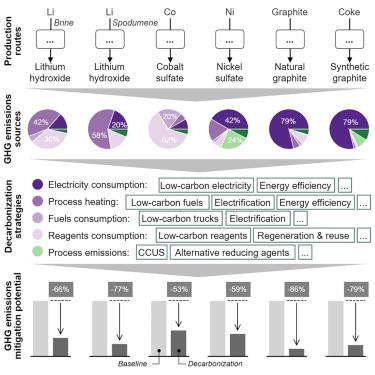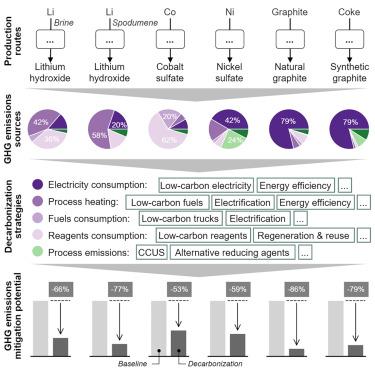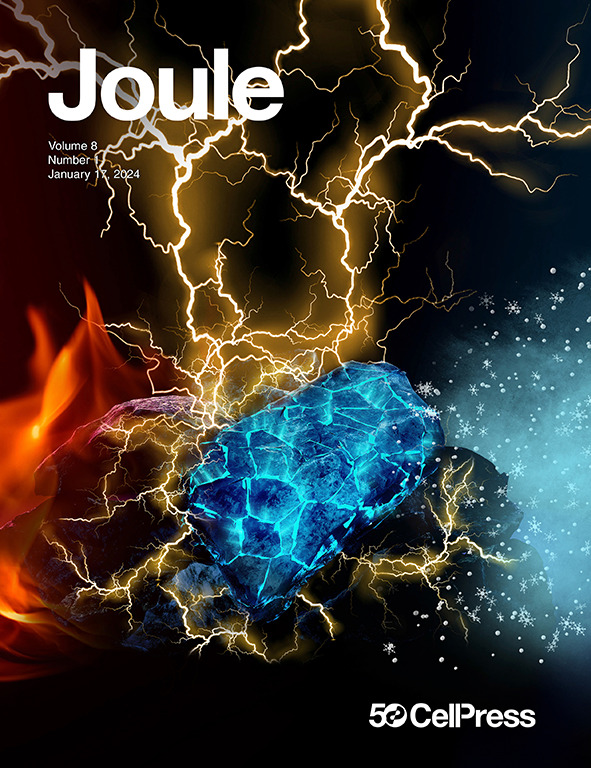Decarbonizing lithium-ion battery primary raw materials supply chain
IF 38.6
1区 材料科学
Q1 CHEMISTRY, PHYSICAL
引用次数: 0
Abstract
Decarbonizing the supply chain of raw materials for electric vehicle (EV) batteries is the ultimate frontier of deep decarbonization in transportation. While circularity is key, decarbonizing primary production is equally imperative. Here, we provide a blueprint for available strategies to mitigate greenhouse gas (GHG) emissions from the primary production of battery-grade lithium hydroxide, cobalt sulfate, nickel sulfate, natural graphite, and synthetic graphite. Shifting to renewable electricity and electrifying heat for mining and refining operations and reagents production emerges as a promising avenue. Combined, these measures can reduce the GHG emissions intensity by 53%–86% for the analyzed production routes. However, these reductions may not achieve absolute decoupling of GHG emissions from the growing demand driven by the rollout of EVs. Bridging this gap may require additional strategies, including low-carbon haul trucks, electrification of processing equipment, reagents regeneration and/or substitution, alternative reducing agents, improvements in material recovery rates, or new and emerging production technologies. Ultimately, an optimized portfolio of strategies is crucial for decarbonizing the production of raw materials that will power a net-zero future.


锂离子电池初级原材料供应链去碳化
电动汽车(EV)电池原材料供应链的去碳化是交通领域深度去碳化的最终前沿。尽管循环是关键,但初级生产的去碳化同样势在必行。在此,我们为现有战略提供了一个蓝图,以减少电池级氢氧化锂、硫酸钴、硫酸镍、天然石墨和合成石墨初级生产过程中的温室气体排放。在采矿、提炼作业和试剂生产过程中转向使用可再生电力和电气化热能是一个很有前景的途径。这些措施加在一起,可将所分析的生产路线的温室气体排放强度降低 53% 到 86%。然而,这些减排措施可能无法实现温室气体排放与电动汽车推广所带来的需求增长的绝对脱钩。弥补这一差距可能需要更多的策略,包括低碳运输卡车、加工设备电气化、试剂再生和/或替代、替代还原剂、提高材料回收率或新兴生产技术。最终,优化的战略组合对于原材料生产的去碳化至关重要,这将为净零排放的未来提供动力。
本文章由计算机程序翻译,如有差异,请以英文原文为准。
求助全文
约1分钟内获得全文
求助全文
来源期刊

Joule
Energy-General Energy
CiteScore
53.10
自引率
2.00%
发文量
198
期刊介绍:
Joule is a sister journal to Cell that focuses on research, analysis, and ideas related to sustainable energy. It aims to address the global challenge of the need for more sustainable energy solutions. Joule is a forward-looking journal that bridges disciplines and scales of energy research. It connects researchers and analysts working on scientific, technical, economic, policy, and social challenges related to sustainable energy. The journal covers a wide range of energy research, from fundamental laboratory studies on energy conversion and storage to global-level analysis. Joule aims to highlight and amplify the implications, challenges, and opportunities of novel energy research for different groups in the field.
 求助内容:
求助内容: 应助结果提醒方式:
应助结果提醒方式:


